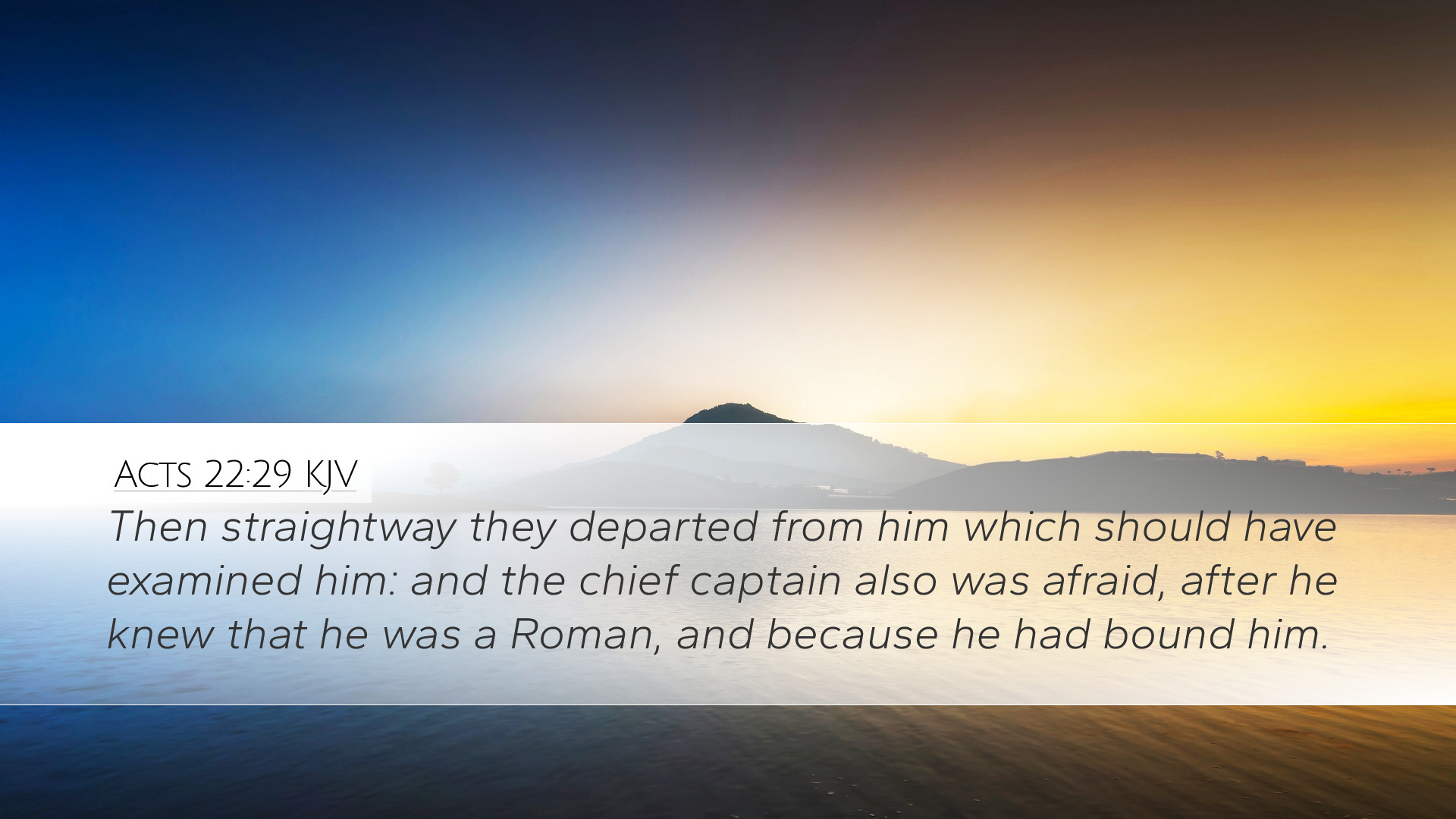Commentary on Acts 22:29
Bible Verse: Acts 22:29 - "Then straightway they departed from him which should have examined him: and the chief captain also was afraid, after he knew that he was a Roman, and because he had bound him."
Introduction
This verse captures a critical moment in the narrative of Paul’s defense before the Roman authorities. It reveals the complexities of citizenship, legal rights, and the wider implications of Paul's identity as a Roman citizen amidst Jewish opposition. The significance of this moment extends beyond the immediate context, shedding light on the early Christian experience in relation to the Roman state. In this commentary, we draw insights from well-respected public domain commentaries, including those of Matthew Henry, Albert Barnes, and Adam Clarke.
Historical Context
Acts 22 details Paul’s recounting of his conversion and calling, during which he faced intense scrutiny and hostility from the Jewish populace. Within this context, the mention of Roman citizenship introduces themes of power, privilege, and protection under the law. Understanding the implications of Roman citizenship in the first century is crucial for interpreting this text.
Significance of Roman Citizenship
As pointed out by Matthew Henry, Roman citizenship conferred formidable legal protections and prestige. Citizens could not be punished without a trial, a right Paul cleverly invokes to escape unjust treatment. His revelation of citizenship not only serves his immediate needs but also instills fear in his captors, as the chief captain recognizes the gravity of binding a Roman citizen without due process.
Examinations and Threats
Albert Barnes emphasizes the abrupt departure of those who were to interrogate Paul, noting their fear upon discovering his citizenship. This fear illustrates the delicate power dynamics at play and highlights the consequences of the Roman legal system. The swift retreat of the interrogators displays their recognition of the potential ramifications of mismanaging a Roman citizen, leading to serious repercussions for them personally.
Thematic Elements
This verse encapsulates several key themes relevant for theological reflection:
- Identity and Belonging: Paul’s Roman citizenship establishes his dual identity as both a Jew and a citizen of Rome, illustrating the intersection of cultural and spiritual identity.
- Justice and Law: The passage raises questions regarding the proper application of justice, revealing the tensions between divine purpose and human governance.
- Courage and Endurance: Paul’s unwavering stance in the face of hostility is a model for believers in an increasingly challenging world.
Divine Sovereignty in Human Affairs
Adam Clarke’s commentary draws attention to the divine control over human events, contending that Paul's experience exemplifies how God can use even oppressive systems to protect His servants. The timely revelation of Paul’s citizenship can be viewed as providential, allowing him to continue his mission. This principle is vital for students of Scripture, as it reminds them that God’s sovereignty often operates behind the scenes in the affairs of men.
Conclusion
Acts 22:29 serves as a testament not only to Paul’s resilience but also to the intricate balance of power during his ministry. The commentary from Matthew Henry, Albert Barnes, and Adam Clarke invites deeper reflection on themes of identity, justice, and divine providence. As pastors, students, theologians, and Bible scholars delve into this verse, they are encouraged to consider both its historical context and its implications for contemporary faith practice.
Reflection Questions
For further study and contemplation, the following questions may guide discussions:
- What does Paul’s identity as a Roman citizen teach us about the intersection of faith and culture?
- How can we discern God’s sovereignty in our own lives amidst societal challenges?
- In what ways do we as Christians participate in justice and advocacy in our world today?


